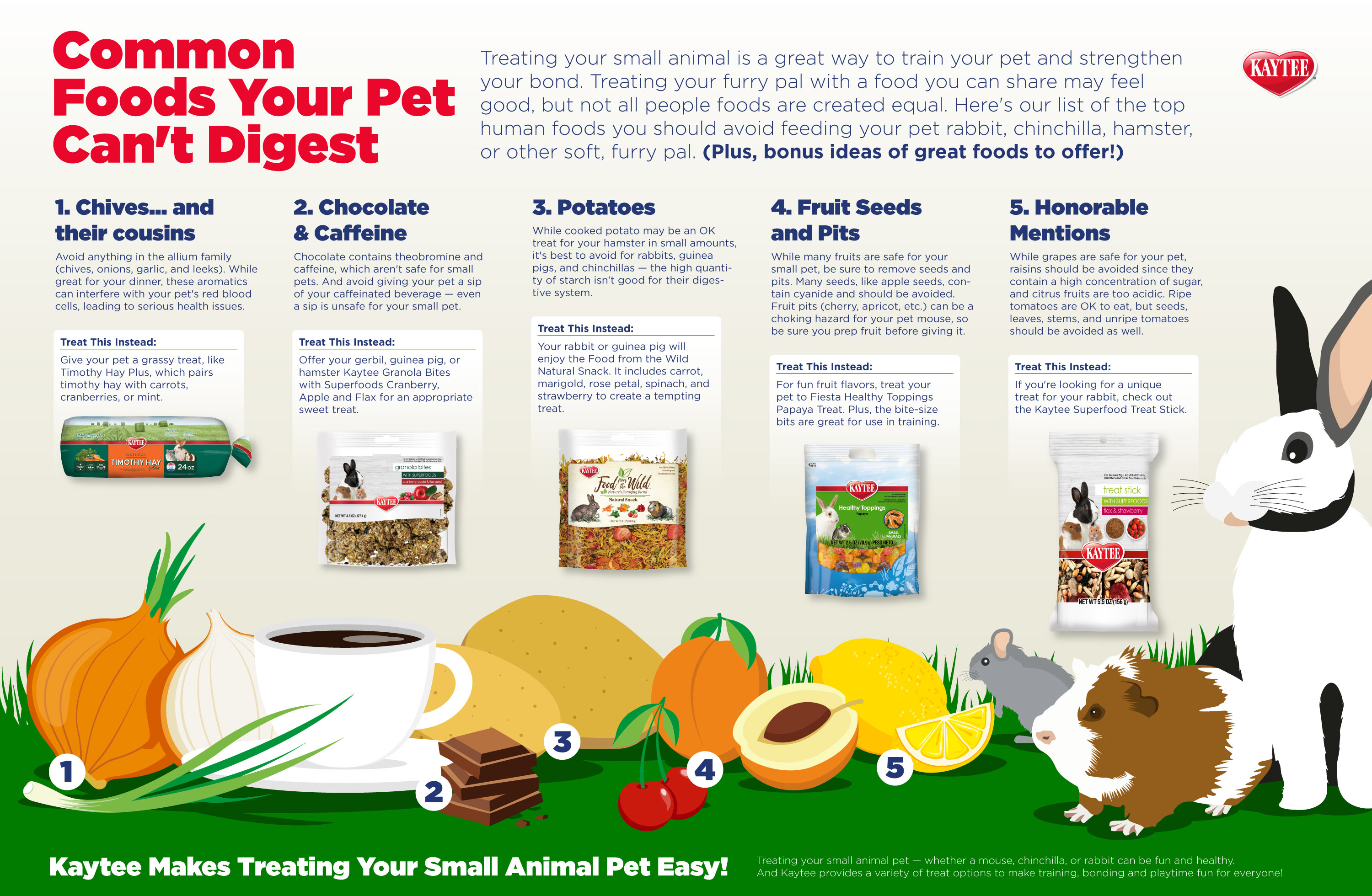Common Foods Your Small Pet Can't Digest
Pets are part of our families, and the lines between what we eat and what they eat may become a little blurred. Dogs are certainly opportunistic, sometimes leaping upon any spilled morsel before we can say, "stop!" This can be fine and even comical until it's a food they shouldn't eat.
But even when you intentionally provide small portions of "people" food to your ferret, gerbil, or hamster, you don't want to accidentally feed them something their bodies can't handle. And sometimes, these "no-no" foods aren't immediately obvious. While such a list is lengthy, here are some common foods that small pets shouldn't digest.
Chives and Their Cousins
This delightful herb makes a terrific addition to many dishes, from breads to potatoes. When you have chives in the kitchen, you might be tempted to share them as a little snack for your small pet. Chives have a great, onion-like flavor and even look a little like chopped grass. But don't share them with your small pet.
While fine for humans, chives have oxidizing properties that interfere with the red blood cells in many pets, which can lead to a type of anemia and create a serious health situation. This is true for most small animals like rabbits, chinchillas, hamsters, and guinea pigs. The same goes for other members of the allium family (onions, garlic, and leeks). Enjoy them yourself, but don't share with your furry family members. If you'd like your small pet to enjoy a grassy treat, consider something like Kaytee Timothy Hay® Plus, which features timothy hay combined with tasty treats like carrots, cranberries, or mint.
Chocolate
Chocolate is a pleasant treat for most people, conjuring up thoughts of Easter, Valentine's, and cozy winter afternoons. It's not hard to see why some people want to share the joy chocolate brings with their pets.
And while it's pretty well known that chocolate is a no-no for dogs and cats, you might be surprised to learn it's actually bad for small animals as well. The reason? Chocolate contains both theobromine and caffeine — stimulants that occur in high concentrations in the treat — which, in pets, can cause health issues. And while you should avoid feeding any type of chocolate, darker chocolates contain the most stimulants.
This also goes for any beverage containing caffeine, like coffee, tea, soda, or energy drinks. While your chinchilla may not be "free-ranging" in your home, don't give in to their curiosity and give them a sip of your beverage.
If you're enjoying a sweet treat and would like to offer your small pets something as well, why not offer a fruity small animal treat like Kaytee® Granola Bites with Superfoods Cranberry, Apple and Flax?
Potatoes
This one is something of a mixed bag. While your hamster may enjoy tiny amounts of cooked potato, it's not usually a recommended small animal snack for rabbits, guinea pigs, or chinchillas. The large amount of pure starch in a potato can interfere with their digestion. Instead of a bite of russet, offer your pet a fun wild treat medley.
Fruit Seeds
Even though there are plenty of examples of safe fruits for pets in small amounts, fruit seeds and pits are another story. Many fruit seeds contain a tiny amount of cyanide, which is, of course, toxic and should be avoided. Fruit pits can pose a choking or digestive hazard for your rabbit or guinea pig. So be careful when preparing things like cherries — a pit that drops to the floor could be a tempting curiosity to the floof keeping you company in the kitchen.
While not from fruits, sunflower seeds are a handy snack for hamsters that can enjoy them in small amounts (though avoid salted or oiled sunflower seeds).
Honorable Mentions
There are a lot of other foods that should be avoided. While we can't cover them all in one article, we have a few additional ones worth mentioning. While the occasional grape is a safe treat for your small pet, avoid giving them raisins as they contain too much sugar. Citrus fruits should be avoided in any significant amounts since they are so acidic. The ripe fruit of a tomato may be OK in theory, but since the unripe fruit, seeds, leaves, and stems should all be avoided, it's probably best to forego tomatoes altogether.
Treating should be easy!
Your small pet can enjoy a wide variety of treats, even when avoiding the ingredients they shouldn't have. The easy thing to remember is that Kaytee offers plenty of safe and healthy treats your small pet will love, and treating this way can help take all the guesswork out of what is safe and what isn't. And armed with the knowledge of common foods small pets can't digest, you can help ensure your pet will be safe the next time they snag a tidbit of people food.

